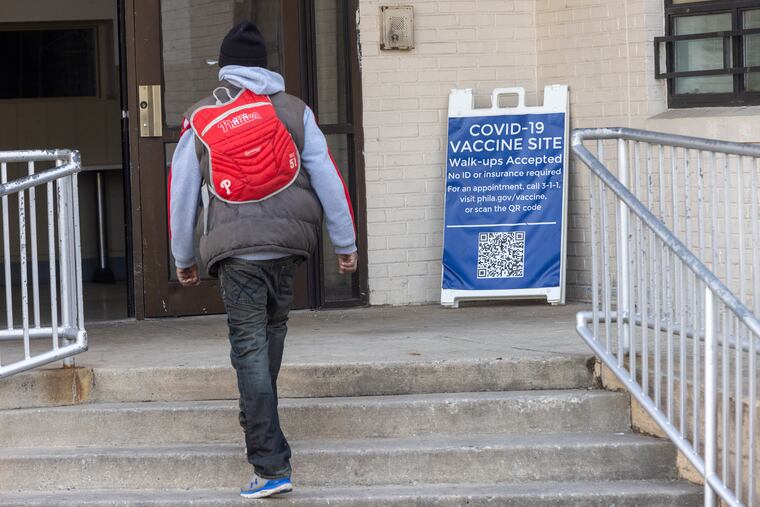New COVID-19 booster is a ‘leap of faith.’ I’m taking it — just not yet.
For me, the question is not the “if” — I’m definitely getting the new booster. The question for me is “when.”

Five months ago, two federal vaccine advisory committees had a vigorous public debate about the need for a second COVID-19 vaccine booster dose. The Food and Drug Administration subsequently authorized, and the Centers for Disease Control and Prevention recommended, a second booster for people ages 50 and over who were fully vaccinated.
At the time, I opted to wait. I met the criteria for a second booster — I was over 50, and it was at least four months since my last shot. But the timing mattered — since immunity to COVID wanes over time, I wanted to time my shot when it would benefit me most.
» READ MORE: I’m a physician over age 50 and I’m not getting my second COVID booster yet. Here’s why. | Opinion
I eventually got the shot two months later, when cases due to the omicron BA.5 subvariant were rising, and in preparation for attending a convention. To date, I have not developed COVID.
Now, I’m faced with the same decision, this time with a reformulated version of the COVID booster.
Recently, the FDA and CDC have authorized and recommended, respectively, an updated version of the booster dose, which targets the original strain and the currently dominant circulating omicron BA.4/BA.5 subvariants. This is currently the only booster dose available for those 12 and over — if anyone seeks one, this is what they are going to get.
Now everyone around me is asking: Should I get this shot? If so, when?
For me, the question is not the “if” — I’m definitely getting the new booster. The question is “when.”
“I’m definitely signing up for a dose.”
Government agencies OK’d the redesigned boosters based on information including studies in mice and limited human data (roughly 600 people) available from studies of an earlier version of the updated vaccines.
These data showed an improved, broad response to all studied variants, including the BA.4/BA.5 subvariants, with no unexpected safety issues. However, we still don’t know the effectiveness of the updated vaccines and how long it lasts. Human trials are in progress or planned, but will take some time.
Without robust data, the agencies took a leap of faith in authorizing and recommending the updated boosters.
Not all experts are on board with the decision, citing concerns over relying on animal data and concerns the new shots won’t be any better than what we have.
But other vaccine experts are lauding the agencies for OKing the reformulated boosters, saying there isn’t any reason to believe the shots will be less effective. Just consider the flu vaccine (which it’s time to get, by the way) — it is updated every year without requiring human studies. The agencies and their advisory committees have expressed their hope that COVID shots will be reformulated the same way each year.
» READ MORE: Do I need the new COVID booster? And other questions you may have.
But there are far too many people who don’t get the flu vaccine, and the same could happen with the updated COVID boosters. Almost half of Pennsylvania residents don’t get their annual flu shot. So it should be no surprise that only half of people eligible for the first booster have gotten it, and only about a third of those 50 and over eligible for the second booster.
People just don’t seem to feel the urgency of COVID anymore.
I sympathize with them. Despite our relaxed attitude toward COVID, cases and hospitalizations are declining (daily deaths remain more steady).
But it likely won’t stay that way.
Based on the available data and discussion at the CDC’s recent advisory committee meeting, I agree with the recommendation to get the updated booster. Given my age, I’m definitely signing up for a dose.
The next question is: When?
Those who received the primary series of vaccines more than two months ago and have not received any booster are most vulnerable and should get the shot as soon as possible. The government has purchased over 170 million doses and has already shipped millions to thousands of vaccine providers who have begun to offer the vaccine.
(One caveat: CDC recommends waiting at least three months after documented COVID infection.)
What about those who have received the first or second booster two or more months ago and are now eligible for the new shot? That includes me. However, I think two months is not enough time between booster shots, as do others.
With disease rates declining, I’ve decided to wait to get the updated booster later in October (almost five months after my last booster) at the same time as my annual flu shot, in advance of attending a convention. This will time the benefits of both vaccines when disease rates begin to climb in the fall and winter.
Others may have good reasons — such as underlying medical conditions — to get the booster at a different time, but I would recommend not waiting later than mid-November, in time for Thanksgiving gatherings. If you’re unsure what to do, talk to a health provider who offers the vaccine.
If we are fortunate and the virus does not change significantly, this may be the last booster we need — at least until next fall.
Eddy Bresnitz is a physician and former deputy commissioner of the New Jersey Department of Health, where he was also the medical adviser to the COVID-19 Response Team. dreddybres@gmail.com